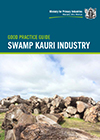EU: From 19 October 2017, each consignment of organic products exported from New Zealand to Europe must have a certificate of inspection (COI) issued by MPI using TRACES. Switzerland: From 1 January 2019, each consignment of organic products exported from New Zealand to Switzerland must also have a certificate of inspection (COI) issued by MPI using TRACES. From 1 January until 31 December 2018, consignments exported to Switzerland may have a certificate issued either using TRACES or the MPI manual certificate system.
6th – 10th August 2018 (Auckland)
6th – 10th August 2018 (Auckland)

The Good Practice Guide for the Swamp Kauri Industry brings together the statutory requirements and regulations for extracting, milling, and exporting swamp kauri timber; provides information on one way that these can be met; and outlines steps to avoid or mitigate adverse impacts to the values associated with swamp kauri.
The following is provided to clarify the nature of information required when raw milk not intended for supply is inadvertently collected. There may be other (very rare) situations that fall outside those anticipated below which would require additional information.
The development of antimicrobials for preventing and curing diseases that were previously either untreatable, or difficult to treat, provided a significant advancement in both human and animal medicine. However, there are significant concerns in New Zealand and overseas regarding the increasing levels of antimicrobial resistance (AMR)1 and the lack of new antibiotics being developed.
This report describes the development of a quantitative risk model to investigate Campylobacter spp. contamination in the processing and consumption stages of the New Zealand poultry food chain. It covers work during the period 2003-2006.
An epidemic of Salmonella Brandenburg abortions in sheep in the South Island, peaking in 2000, and consequential increase in human cases and detections on sheep meat resulted in a "Quantitative risk assessment of Salmonella in sheep meat produced in New Zealand (Sal-QRA)". The Sal-QRA programme has identified the prevalence and levels on carcass meat of Salmonella after slaughter, and demonstrated a significant decrease during processing. Similarly, the failure to identify any cases-control association with consumption of sheep meat suggests that a foodborne route of infection is not contributing significantly to the burden of S. Brandenburg cases.